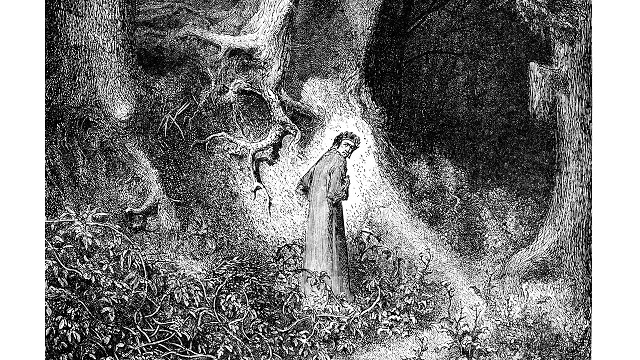.
The Beginning of Wisdom
Within the passing noon of our own life,
I saw through woodlands dark and traces grim,
Those words upon the graven arches rim,
Whose clarity compounds immortal strife.
They claimed their maker was that power divine,
The highest wisdom and the primal love,
Who makes and moves the sun and stars above,
And set this portal deep below the brine.
Great gates of steel lay broken to the side,
Their hinges warped and bent as at a blow.
Rude barricades scarce filled a gap so wide,
That any soul who pleased might come or go.
And the remains of men who have just died,
Were urged by frantic whispers not to slow.
.
.
T.M.A. Day is in formation for the Catholic priesthood in the Archdiocese of Indianapolis, Indiana.




A devotional Petrarchan sonnet. Very polished and technically adept, and an accomplishment to be proud of (at least if you hadn’t taken holy orders!). One minor point: is there a particular reason why you’ve written “have” rather than “had” in the penultimate line?
Thank you! A good point on have v.s. had – I thought that it would convey a greater sense of immediacy as the poem progressed, but now I am second guessing it.
The image that came to my mind was of a decrepit cemetery with the concept that earthly interment is for the mortal body, but the tombstones herald the beginning of wisdom.
An intriguing piece with a number of interpretations which I’ll be sifting through.
Thanks for the read.
N.B. – It might be helpful to open up to Inferno, Canto III, in whatever version of Dante you have around.
I think this is both a marvelous poem in its own right, and also such a good echo of Dante that it could be mistaken for his writing.
Why is it “the passing noon of our own life” instead of “the passing noon of my own life” given that in the next line you refer to “I”? The Petrarchan sonnet is a good choice for a poem reflecting Dante, but it doesn’t strictly adhere to the abbaabba rhyme scheme in the octet. Is there a reason for the variation?
The plural in the first line is a reference to the first line of the Comedy, which is normally translated to the effect of: “Mid-way through the journey of our life,” before switching to the singular.
As for the variation, it was more the fact that I wanted the second quartet to mirror as strongly as possible a line and a half from Canto III while referencing the last line of the whole Comedy, “the Love which moves the sun and other stars.”
Greetings!
This is ethereal! The cadence was adept – each word had its importance. Awe inspiring stuff.
Thank you for this poem.
For this to be a sonnet in its own right, it can’t depend so much on Dante that the poem makes no statement of its own about the beginning of wisdom. “Any soul who pleased might come or go” seems to be that statement. Sin and hell are not inevitable. However, I find the idea obscured both by the Dantesque atmosphere, and by common-sense Christian faith applied to the sonnet situation. By the atmosphere, I mean the sonnet ending with frantic whispers, seeming to emerge from hell, and urging souls to hurry up and enter. That makes sense insofar as it contributes to the terror of Dante, a temporary visitor who will see hell and report on its horrors. Common sense, though, says that the souls of the deceased enter hell by choices made during life. They have no choice after death, and cannot go out again if they please. The sonnet’s pronouncement about the beginning of wisdom is addressed only to the living with choices still to make. Hell does its best to make that unclear. Having come back to read this poem a number of times, I take it the hellish lack of clarity is intentional, but I find that the darkness achieved leaves the reader looking for the wisdom.
The “portal deep below the brine” could also be a confusing detail. Of course, you mean Dante puts hell beneath the surface of the earth, but an underwater scene comes to mind. Looking at Canto III, I see that Dante wisely refers to air.